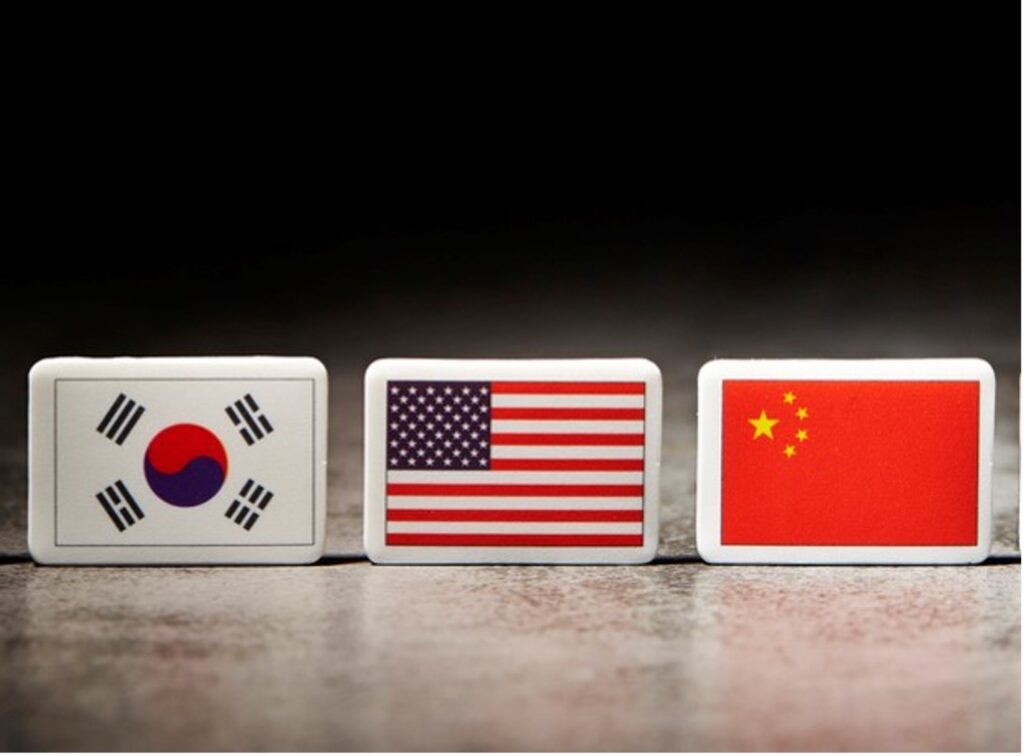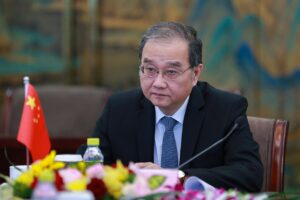Under President Joseph Biden, the United States is implementing a more pragmatic approach to mobilizing allies in its strategic competition with China in the Indo-Pacific. With threat perceptions towards China quickly growing, some countries in the region like Japan and Australia have taken unprecedented steps to further align with the U.S., forcing South Korea to confront the greater difficulty of maintaining strategic equilibrium between Beijing and Washington.
China, on the other hand, believes: “the East is rising, and the West is declining,” and thinks it has the means to further facilitate this shift in the balance of power in and beyond the Indo-Pacific region. From Beijing’s perspective, the Association of Southeast Asian Nations (ASEAN) may be the most important counterweight against the expanding influence of U.S.-led coalitions, such as the Quadrilateral Security Dialogue (QUAD). Notwithstanding, South Korea remains the weakest link in the U.S. security alliance network in the region, and Seoul’s strategic choice between Beijing and Washington would serve as a very important example for other regional states that are currently on the fence. For the foreseeable future, the role that South Korea might play in regional geopolitics, security, and geoeconomics is particularly important to China.
Geopolitics
China has come to the conclusion that the United States is determined to contain and undermine China and that U.S.-led coalitions and regional initiatives are inherently anti-China in nature, including the U.S.-ROK-Japan trilateral alliance, the QUAD, the QUAD+, the Five Eyes, and the U.S. Indo-Pacific Strategy. Chinese experts have highlighted South Korea’s concerns about these initiatives, such as the special role Japan has played in advancing the QUAD and the fact that the Korean Peninsula might receive less U.S. attention in the QUAD and the Indo-Pacific strategy. However, China is also aware how South Korea’s own geopolitical ambitions, including its desire to acquire higher international status, can incentivize it to become actively involved in U.S.-led coalitions. South Korea appreciated the invitation from the U.S. to join the G7 summit meeting, which reminds China of the unique appeal of U.S.-led international institutions.
U.S. and South Korean efforts to develop a comprehensive strategic alliance indicate to China that the bilateral alliance is being expanded into many other issue areas beyond its traditional focus on maintaining security on the Korean Peninsula. Given China’s deeply rooted concern about U.S. strategic intentions, the broadening of the functional and geographical scope of the U.S.-ROK alliance is interpreted by China as menacing. Similarly, although South Korea has tried to only participate in the less sensitive areas in QUAD, such as nontraditional security, vaccine cooperation, cyber security, and climate change, China worries that deeper U.S.-ROK cooperation in regional and international governance could still draw South Korea closer and closer into the United States’ geopolitical orbit.
Closely related to these concerns is the Chinese belief that Washington is seeking to include Seoul in an ideological coalition against China. In the face of growing international criticism against China in recent years over human rights, democracy, rule of law, and other value-related issues, China feels victimized, as it believes it is not seeking to spread its ideology beyond its borders. China understands the threat of the ideology issue to the survival of its political system, which is why it hopes that South Korea is in a position to push back against the perceived U.S. siege. Given the need to manage its relationship with North Korea, South Korea could be more willing to accommodate the diversity in political systems and ideologies than other Western democracies. Chinese experts also point out that South Korea has voiced concerns about a renewed rivalry between two country groups along their ideological division and that South Korea’s interests could be most negatively affected by this type of ideological competition due to South Korea’s central location between the two blocs.
Security
China’s most important security goal is to ensure that the U.S.-ROK alliance will not play a role in security matters beyond the Korean Peninsula. This indicates a few Chinese expectations: that U.S. and South Korean troops will not jointly operate in places other than the Korean Peninsula; South Korean troops will not be deployed beyond the peninsula in response to emergencies involving the United States; and American troops stationed in South Korea will not obtain greater strategic flexibility, in the sense that American troops and weapons deployed there will not be used in response to emergencies in other places. China has increasing concerns that the U.S.-Japan alliance has expanded to the point of threatening China’s freedom of military activity in the Taiwan Strait, the South China Sea, and other places that are of China’s core interests. As such, it is strongly motivated to prevent a similar expansion of the U.S.-ROK alliance.
In the aftermath of the termination of the Intermediate-Range Nuclear Forces (INF) Treaty, China has pressed South Korea to resist the deployment of U.S. medium- and intermediate-range conventional missiles on its territory. This makes it more politically challenging for Beijing to oppose Seoul’s development of indigenous conventional missile capabilities. However, China worries how South Korean missiles may be employed in future conflicts, especially in potential cooperation with the United States. There is the concern that South Korean missiles would practically become part of U.S. capabilities before Washington transfers wartime operational control authority to Seoul. There is also the concern that South Korea could launch a large number of its missiles to saturate China’s missile defense capacity, making it easier for the United States to attack China’s strategic military targets, such as nuclear weapon facilities. Some of these concerns do seem far-fetched, but they highlight the importance of reducing such misunderstandings.
Despite President Moon Jaein’s promise that South Korea will not join the U.S.-led missile defense network, Chinese experts believe this is almost inevitable at the operational level as South Korea depends on U.S. early warning data to operate some of its own missile defenses and has an interest in promoting bilateral technical-level integration. It is quite debatable if the introduction of U.S. missile defense systems in South Korea is aimed at neutralizing China’s nuclear deterrent, but Chinese experts appear to be genuinely concerned. They also worry that a less robust nuclear deterrent could then undermine mainland [DS1] China’s overall security interests in the region, including Taiwan, the Senkaku/Diaoyu Islands, and the South China Sea. This serious perception gap on the missile defense issue has to be addressed as it continues to encourage worst-case scenario thinking in Beijing.
To stabilize the China-ROK security relationship, Chinese experts have been more and more explicitly arguing that the U.S. military presence on the peninsula eventually has to be reduced. Many of them believe Washington is pushing for a new Cold War with Beijing in the region, which is against the interests of both Beijing and Seoul. They also generally agree that Washington is the biggest obstacle to achieving North Korean nuclear disarmament as the U.S. military’s presence and activities make Pyongyang constantly fear for its security. There is some acknowledgment that Pyongyang’s continued development of nuclear and missile technologies creates incentives for Seoul to build up missile and missile defense capabilities.
However, Beijing’s growing perception gap with Washington and sympathy toward Pyongyang make it hard to reach a common solution to freeze North Korea’s development of nuclear weapons. There is even the suspicion that Washington won’t let Seoul improve the inter-Korean relationship and create the necessary conditions for Pyongyang to denuclearize unless Seoul agrees to help Washington contain Beijing. This further reduces the Chinese expectation for there to be genuine U.S.-China cooperation in tackling the North Korean problem.
Geoeconomics
The United States and other QUAD members are continually making efforts to downplay the military and security dimensions of their coalition and instead stress the importance of cooperation in building resilient supply chains, sharing high technologies, and enhancing mutual investments in key industries. South Korea is also stepping up its cooperation with QUAD countries in areas such as strategic supply chains, 5G, semiconductors, and new energy technologies. These efforts are due, in part, to encouragement from Washington and, in part, Seoul’s own interests in seeking diversification and reducing over-dependence on Beijing. China views these measures as promoting gradual economic and technological decoupling between China and the Western bloc and believes these items present a more fundamental long-term threat to China.
China’s growing confidence in winning the great power competition has rested on the belief that China’s overall economic power will surpass the United States and eventually propel China into a stronger technological and military power as well. However, the perceived U.S.-led regional effort to accelerate economic and technological decoupling before China could achieve sufficient self-reliance would introduce serious uncertainty to China’s long-term economic and geostrategic goals. The stakes are too high for China not to double down on its efforts to maintain its economic and technological ties with South Korea. Chinese experts are also largely optimistic that Beijing’s overwhelming economic influence over Seoul would convince Seoul not to pursue policies that could undermine its economic ties with Beijing.1South Korea’s current trade with China exceeds the combined total of South Korea’s trade with the United States and Japan. See: Zhan Debin, “Republic of Korea’s Cognition and Policy on the U.S. Indo-Pacific Strategy,” Northeast Asia Forum, no. 2 (2021): 22-40.
This does not mean China itself has a coherent long-term economic strategy. As China seeks to prevent economic and technological decoupling, Chinese leaders are emphasizing the importance of achieving self-reliance in all key economic and technological areas. This has led to the international perception that China is advancing its own self-reliance with the consequence of creating asymmetric vulnerabilities for other countries that still depend on Chinese supplies. This perception could accelerate efforts by other countries, including South Korea, to reduce their economic and technological interdependence with China and deepen their cooperation with open market economies as a measure of self-protection. International observers also believe that Xi Jinping’s ambition to regain government control over private economic sectors in his effort to revitalize the socialist system in China could drive out more foreign investors. Uncertainties introduced by internal factors play an increasingly important role in affecting China’s economic relations with South Korea and other regional countries and influencing the geoeconomic landscape.
In recent years, China has clearly underestimated the deterioration of the U.S.-China relationship, the reinvigoration of the QUAD coalition, and the worsening of its geostrategic environment. Despite the hope that South Korea would continue to play a bridging role between China and the U.S.-dominated regional order, there is growing concern in China that South Korea may be drifting toward the U.S. orbit. All of the perceived worrisome developments in geopolitical, security, and geoeconomic areas are attributed to U.S. hegemonic intentions and Cold War thinking against China as opposed to China directly blaming South Korea. Nonetheless, the Chinese government’s overall domestic view appears to be that China must use its growing power and leverage to keep South Korea from going too far and set an unambiguous example for other fence sitters. From the Chinese perspective, the stakes are high for China and the region.
Despite all this, there are few concrete ideas from Chinese experts in the public domain about how China could proactively act to promote a regional order that is favorable to China or even what kind of regional order China would like to see in the future. This may be partly due to the fact that China has largely seen itself as on the defensive in recent years and preoccupied with responding to new perceived threats from the United States and its allies. In a few months, Chinese experts could scramble again to respond to another potentially important change in the regional geostrategic landscape if a conservative president is elected to the Blue House and turns South Korea to a more pro-U.S. trajectory.
The implications of this crisis mindset that Chinese decision-makers may be viewing things from have not been fully examined by analysts. Better understanding of Chinese thinking would help promote constructive diplomacy and maintain regional order against the backdrop of growing strategic turmoil.
Notes
- 1South Korea’s current trade with China exceeds the combined total of South Korea’s trade with the United States and Japan. See: Zhan Debin, “Republic of Korea’s Cognition and Policy on the U.S. Indo-Pacific Strategy,” Northeast Asia Forum, no. 2 (2021): 22-40.




